Author: Rafael Orellana
Great news for little travelers! Quito Airport reopens the children’s area.
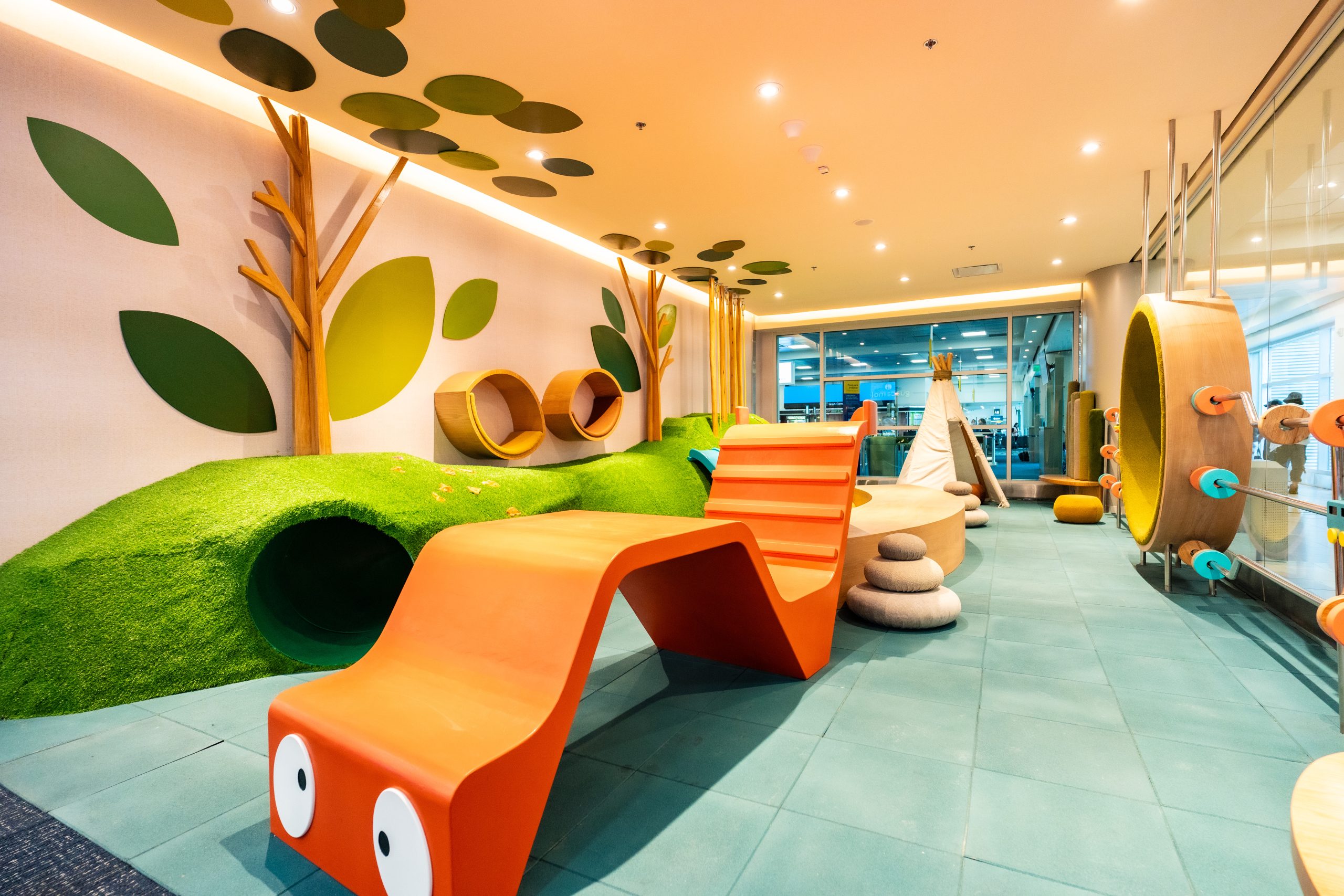
The children’s area, located next to domestic pre-boarding area at the Mariscal Sucre International Airport passenger terminal, reopens its doors for the litter travelers, now with a renewed image after its closure due to the Covid-19 pandemic.
Aware of the importance to provide a safe and fun space for children, CorporaciónQuiport, the company in charge of managing the Quito airport, has decided to renew this area. The new design aims to create a magical and educational environment, inspired by the biodiversity and nature of Ecuador, without neglecting the security that this type of spaces must always maintain.
The children’s area has been carefully designed to offer little travelers the opportunity to explore and connect in a playful and sensory way with the natural environment. Various elements and textures that stimulate touch have been incorporated, imagination and learning. In addition, pieces-counting games that promote the development of mathematical skills have been installed, as well as climbing structures, tunnels and slides to encourage physical activity, contributing to the comprehensive development of children.
One of the novelties in this design is the inclusion of a small quiet space with dim lighting, designed especially for those children who prefer to enjoy a more relaxed and independent environment. It is a hut with comfortable seats, a space that offers moments of tranquility and rest within the play area.
The reopening and remodeling of this area for children demonstrates Quiport’scommitment to provide a complete and satisfactory travel experience for all passengers, including the little ones. Now, children will be able to enjoy a safe, fun and educational space while waiting for their flight, creating unforgettable memories from the beginning of their trip.
Faunaetus celebrates 10 years managingresponsibly wildlife at the Quito airport
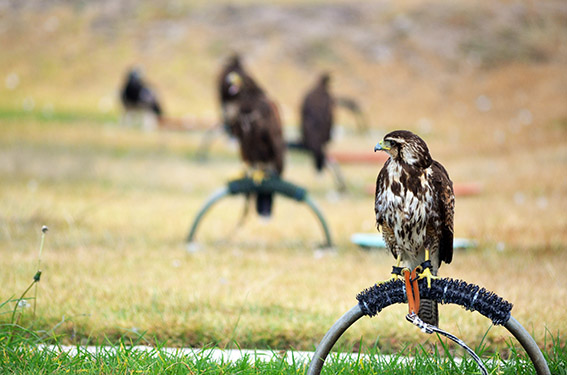
We celebrate a decade of extraordinary contributions by Faunaetus in wildlife management at the Quito airport, as well as in the harmonious coexistence between the airport operation and wildlife.
We remember the arrival of Faunaetus in 2013, when the operation of the new Quito International airport began and the need to work responsibly with the surrounding fauna. We came from an airport in an urban area to one located in a totally different environment in the middle of terrestrial fauna and birds. Due to this, the best and most effective method to control the fauna was carefully analyzed according to the kind of animals that we would find in the airport area and its surroundings.
“Fortunately, among other specialized teams that applied, we met Faunaetus, the company that best suited the needs, with a team of four highly qualified people,” says Gabriela Landázuri, EHS manager of Quiport, who participated in the design of the fauna control model. Ruth Muñiz, who came from Spain and has a PhD in Biology, and an expert in birds of prey, Paúl Tufiño who has a master’s degree in Biology, and two falconers, one of them a biologist and the other a zootechnician, formed the ideal team to begin this delicate task and carry out the corresponding analyzes to adapt their methods to the needs of the airport. Thus, it was decided that the best alternative was to use falconry techniques, together with other activities to reduce the risk of fauna in airport operations.
At the beginning, Faunaetus brought 2 saker falcons and 6 Harris eagles from Germany, along with a border collie dog from Colombia. These animals, after being trained in musculature and adaptability to the environment, began their service together with a labrador dog that was in the country. In just two months, Faunaetus managed to implement a complete service that met the wildlife control objectives in the airport.
Birds of prey make flights to mark territory and prevent other species of birds from approaching areas where they represent a risk for the operation of aircraft, while dogs are in charge of turtle doves and other birds that perch on the ground, as well as terrestrial fauna that may approach sensitive areas of the airport. Over time, more birds and dogs were included in the team.
Through exhaustive analysis and practical experiences, Faunaetus and the Quiport EHS Department managed to change the initial objective of fauna control to more sustainable management. It was identified that certain species of birds do not represent a risk to airport operations and, therefore, measures were implemented to allow their permanence at the airport, of course, with regular controls and monitoring.
This initiative has led to a respectful coexistence between birds and airport operations, a unique achievement in the industry where it is generally sought to avoid the presence of birds in the vicinity of airports as they represent a risk in the operation.
Currently, the Quito airport has a team of 6 specialists who manage the fauna with the help of 10 Harris eagles, 3 peregrine falcons, 2 saker falcons and 4 border collie dogs, all contributing effectively to security and safety. responsible management of fauna in our environment.
We congratulate and appreciate the service and progress that Faunaetus has had during these 10 years!
Nuestra Huerta, Quiport’s shared value project, celebrates ten years of continuous growth.
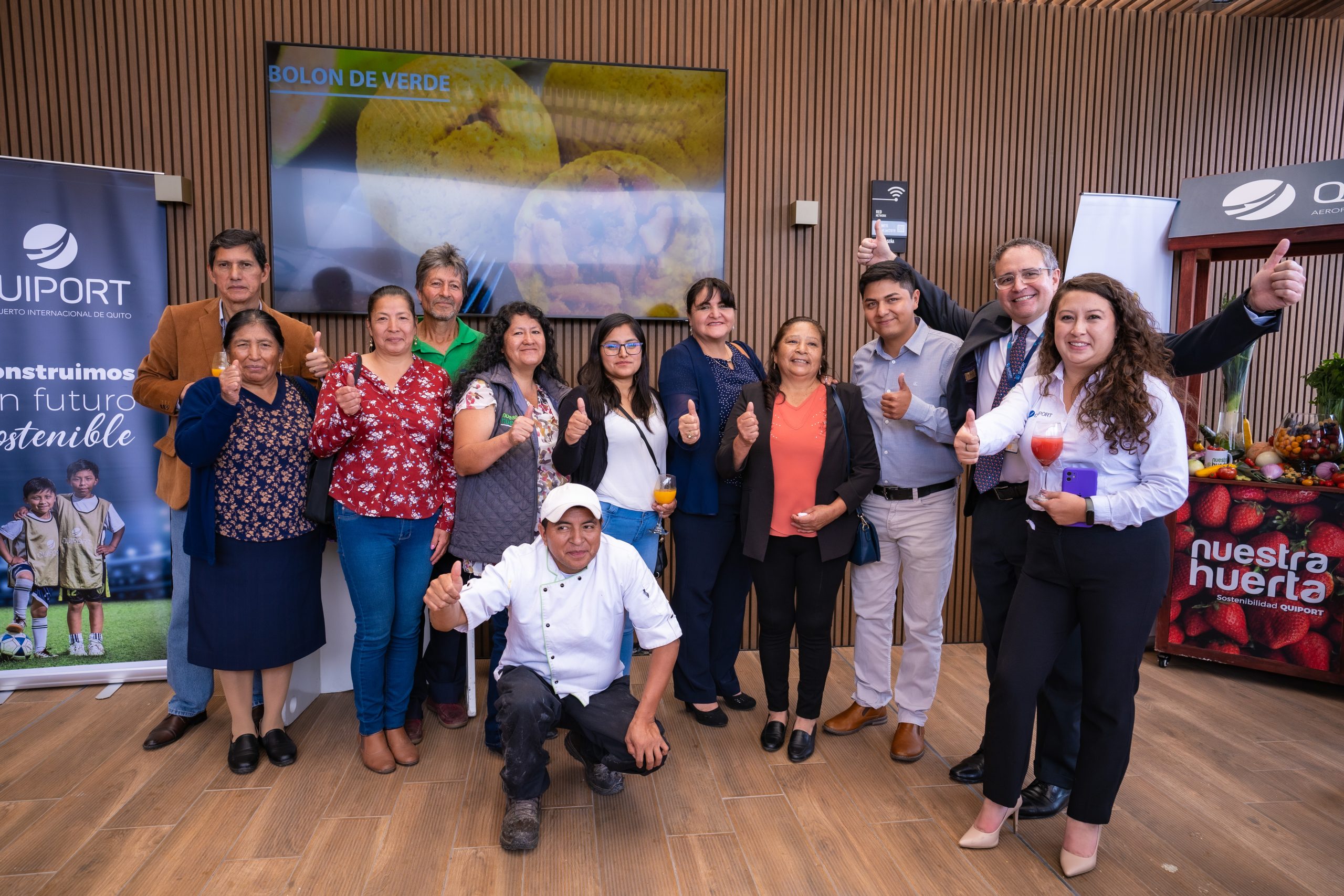
Nuestra Huerta, the emblematic shared value program that Corporación Quiport develops together with the communities neighboring the Mariscal Sucre International Airport, celebrated ten years since it began in November 2013. Nuestra Huerta integrates small agricultural producers from the area surrounding the operation airport in a community marketing chain in which airport collaborators and users participate, consuming local production.
In celebration of the tenth anniversary of the project, Ramón Miró, president and CEO of Quiport, explained the driving philosophy behind this project and all the management of sustainability in the company: “we seek to be faithful to our purpose, we do it good because we value life. We value the life and quality of life of the people who live in the communities, who can improve their income and progress. But we also value the lives of our collaborators and visitors, who consume natural and healthy products in Nuestra Huerta.”
80 community producers and their families participate in Nuestra Huerta and it has a positive impact on their economy, since their income has improved significantly. 400 airport employees regularly purchase products from this entrepreneurship – seasonal fruits, bakery products, honey, eggs and ready-to-eat products-.
Sustainability involves the notion of allowing orderly development that benefits everyone and benefits our activity; that is the spirit with which this shared value project was born around the Quito airport.
Designed as an entrepreneurial project derived from the Quiport Social Management Plan; With the technical support of the Inter-American Development Bank (IDB), Nuestra Huerta evolved into a shared value scheme, that is, as a strategy that analyzes the social environment in which an organization operates, to renew its processes and generate profits impacting positively to communities at the same time.
The first stage of Nuestra Huerta was focused on training plans for the residents of the area, along with the consolidation of the internal market at the airport; Once the potential was developed, these products began to be marketed among the employees who are part of the companies that operate at the airport, thus creating a productive chain.
In 2017 Nuestra Huerta opened its physical store at the Quito airport, next to the Quiport offices, starting a new stage of the project. With the project already consolidated, Nuestra Huerta producers formed the community company Productora Agrícola Alpachaca Muyuverde CIA. Ltda. which allows them to manage the store located inside the airport.
In this way, Nuestra Huerta’s customer base went from airport collaborators to passengers, users and visitors. This growth in the customer base also allowed us to expand the product offering, from fruits, vegetables and bakery products, to also offering products for immediate consumption such as chopped fruit, yogurt with granola, healthy snacks, empanadas, bolas de verde, mote con chicharrón and many more, all coming from the airport’s area of influence.
An important milestone was the participation of teachers and students from the Agronomy Engineering program at the San Francisco University of Quito, who carried out very important training and advisory work with the producers of Nuestra Huerta on topics such as the management of farming techniques. cultivation, improvement of disease and pest control, and development of new varieties.
The celebration of the tenth anniversary of Nuestra Huerta, held in the International VIP Lounge at the Mariscal Sucre International Airport, was a great opportunity to share more details of the project with organizations, people and media that work on sustainability issues.
Quito Airport welcomes JetSMART, ultra low cost airline
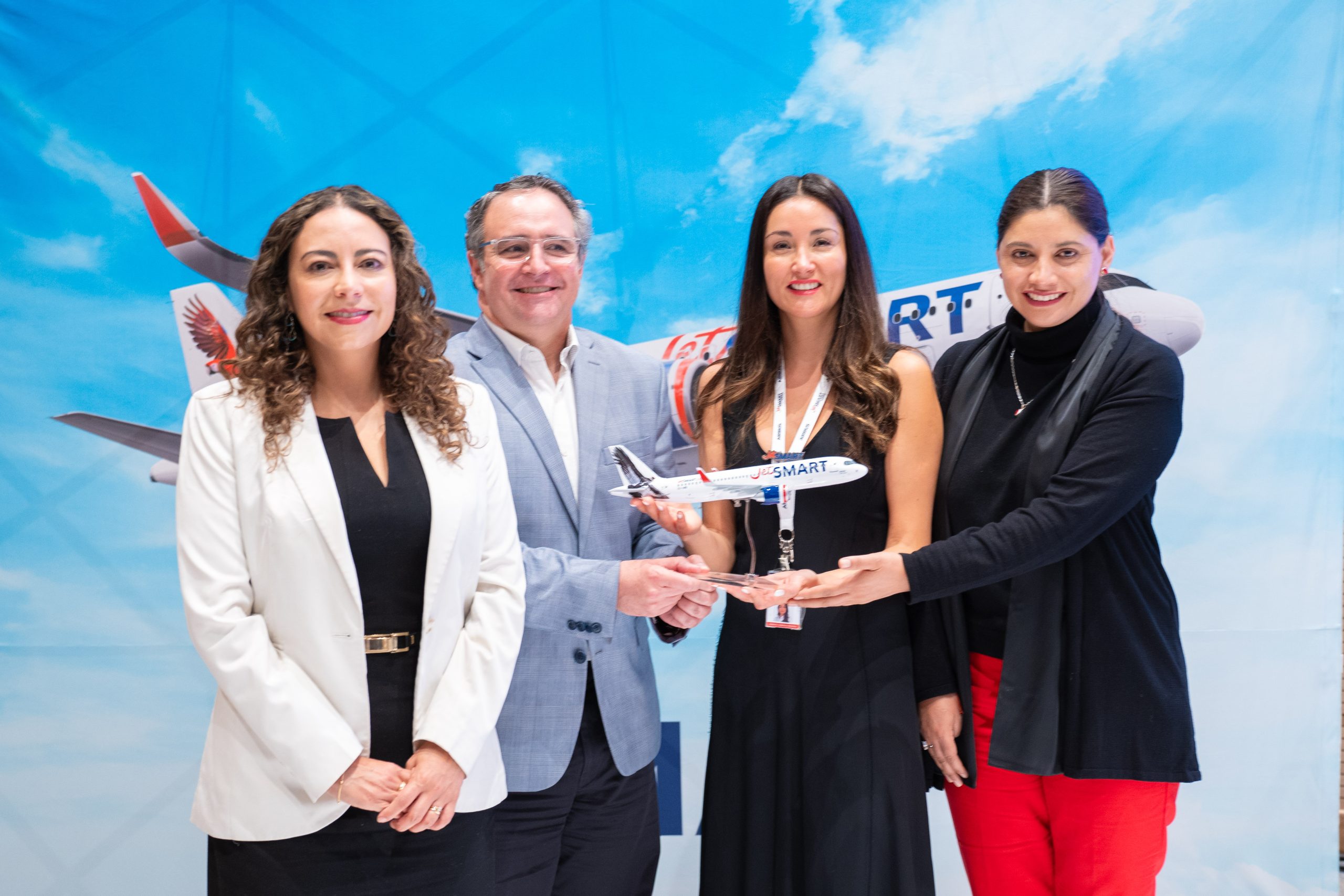
- The airline JetSMART began selling tickets this November 21st to fly the routeQuito-Lima starting March 6, 2024, thus establishing direct non-stop flights between the two countries.
This morning the arrival of JetSMART Airlines, the prominent ultra-low-cost airline, was officially announced. It will begin operations on the Quito-Lima route from March 2024, with the option to purchase tickets starting November 21, 2023.
The airline will operate the new route three times a week, on Wednesdays, Fridays and Sundays, using the new generation of Airbus A320 aircraft, an ideal model for this type of route.
JetSMART, part of Indigo Partners, a private fund with more than two decades of success in creating ultra-low-cost airlines on a global scale, is present in Colombia, Brazil, Uruguay, Paraguay, Argentina, Chile, Peru and now, Ecuador. They arrived with a clear vision of development and expansion in the airline sector, committed to offering ultra-low-cost flights on new aircraft.
Ramón Miró, president and CEO of Quiport, highlighted: “For some time we have been looking for an airline with the characteristics and successful track record of JetSMARTto join the Mariscal Sucre airport’s connectivity offering and today we are happy to officially hear the starting ticket sales announcement and future start of operation. Relations between Peru and Ecuador still have enormous potential to explore in business, tourism, and culture, and I am sure that the operation of JetSMART, with an ultra-low-cost model, will boost the growth of that exchange and will be an important catalyst. to strengthen relations between these two brother peoples.”
JetSMART has been recognized by Skytrax Worldwide Awards as the Best low-cost airline in South America in 2021 and 2023, thanks to its service, commitment to safety, and the accessibility of its fares, which generate tangible benefits for passengers.
Starting today, Avianca takes you from Quito to the happiest place in the world non-stop.

- With the aim of enhancing its point-to-point connectivity, the airline reinforces its direct connectivity offer from Ecuador to North America.
- With the launch of these operations for the high season at the end of the year, Avianca customers will have around 16 routes available, in the most complete network in Ecuador.
Starting yesterday, October 29, visiting and enjoying the happiest place in the world in Florida is just one flight away from the Ecuadorian capital, thanks to the operations start of the new direct Avianca Quito-Orlando route that offers 2 weekly frequencies and more than 1,400 seats available per month on an Airbus A320 aircraft. With this new route, the fourth inaugurated this year, Avianca reaffirms its commitment to being the airline that provides the greatest non-stop connectivity to Ecuadorians.
The new destination joins Avianca’s network of 16 international routes that connect Ecuador with the world. “We remain committed to the connectivity of our country with the United States and to our customers so they can enjoy more destinations. We are the first airline to offer this non-stop route to Ecuadorians and without a doubt, we have the best option to fly by customizing each trip,” highlighted Juan Francisco Ortiz, Avianca’sCountry Officer for Ecuador.
Avianca’s itinerary is this:
| Flight | Route | Departure time | Arrival time | Frequencies |
| AV7398 | Quito-Orlando | 07:35 | 13:05 | Wednesdays and Sundays |
| AV7399 | Orlando-Quito | 14:30 | 18:00 | Wednesdays and Sundays |
The Minister of Tourism, Niels Olsen, assured that this new route strengthens connectivity with the United States, indicating that by the end of 2023 it is expected to have recovered 100% of international connectivity. “Our skies are increasingly competitive and attractive to fly, so we will continue working so that Ecuador continues to be connected by air to the world.”
“The teamwork between the Government of Ecuador and commercial airlines generates a great impact on international air connectivity. Our Open Skies policy has allowed us to increase international routes and frequencies with the United States, thus providing more comfort to national and foreign passengers. We congratulate Avianca for this new direct route to Orlando, one of the destinations most frequented by Ecuadorian tourists,” commented César Rohon, Minister of Transportation and Public Works.
“Orlando is one of the most important family entertainment hubs worldwide and one of the favorite destinations for Ecuadorians. Avianca makes a new commitment to a direct destination from Quito and we are sure that the fruits will begin to arrive soon. Thank you Avianca for uniting two magical destinations, each one in its own way, each onewith spectacular experiences to discover. I hope that this new route also serves to attract more tourism to our city,” said Ramón Miró CEO of Quiport.
Currently, Avianca has direct international flights from Quito to Bogotá, San Salvador, San José, Buenos Aires, Medellín, New York and now Orlando. From Guayaquil to Bogotá, San Salvador and New York. And, with the domestic operation it connects the cities of Quito, Guayaquil, San Cristóbal, Baltra, Cuenca and Manta.
Tickets are now on sale at MY App avianca, avianca.com, physical points of sale, and through travel agencies.
Quiport is recognized as one of the best companies to work in Ecuador
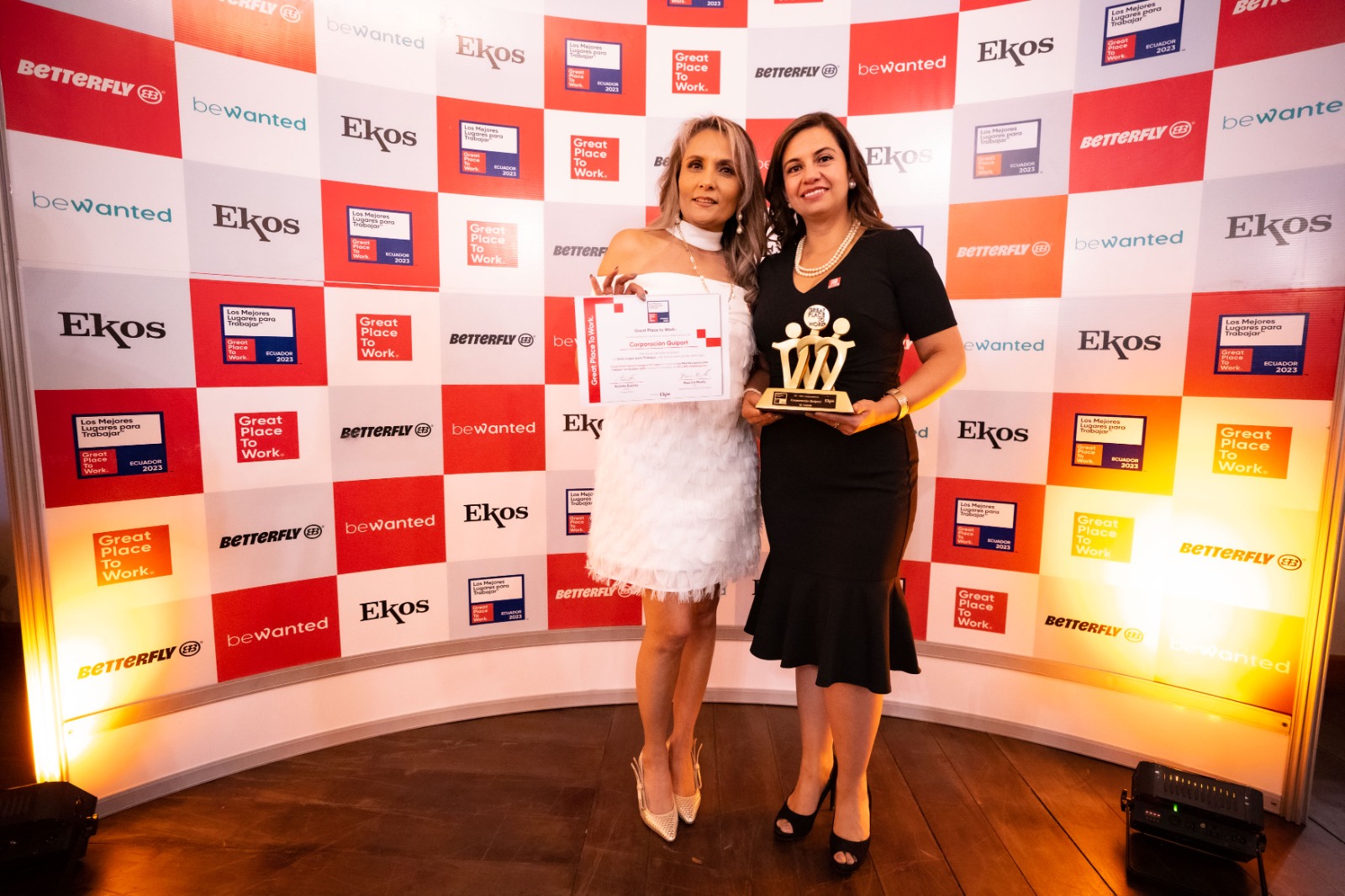
- The company has been working since 2019 with the Great Place to Work model.
- Living corporate values is essential to strengthen a culture based on customer orientation, sustainability and leadership every day.
On the night of February 15, Corporación Quiport received the Great Place to Work (GPTW) recognition as one of the 15 best companies to work in Ecuador in the category of between 101 and 500 employees.
The company, concerned with knowing and having a quantitative view of the work environment, has been working since 2019 with the GPTW model, which is the only platform based on 30 years of research to quantify organizational culture and measure employee commitment.
Great Place to Work has developed and validated worldwide a model for the study of the work environment supported by five dimensions:
- Credibility
- Respect
- Impartiality
- Camaraderie
- Pride
This survey offers 2 sources of information based on the 5 previous dimensions, quantitative results and also comments from collaborators regarding their perception of the work environment.
At Corporación Quiport, the corporate philosophy is a rudder that directs the entire human team towards a single direction with clear guidelines on what to do and how to do it. What to do is based on the company’s strategic goals that are the basis for comprehensive management, one of those goals is to keep employees efficient and committed, so the objective is to provide a great place to work with a focus on important aspects such as having a safe work environment, concern for comprehensive well-being, professional development, all accompanied by empowered leadership.
“Living our values is essential to strengthen our culture day by day based on customer orientation, sustainability and leadership,” said Ramón Miró, President and CEO of Corporación Quiport, and added: “Based on the results obtained in 2021, we set out to work on the different variables of the GPTW model, establishing the Leadership dimension as a guide, with clear actions implemented during 2021 and 2022 and that are now reflected in the results of the last measurement carried out at the end of the year 2022”.
The programs designed to consolidate our work environment have been: recognition through the ‘We are Quiport we are Wow!’ program, strengthening of leadership through the ‘I am Quiport Líder’ program, dissemination and reinforcement of guidelines to maintain a safe work environment free of harassment, development and attraction of talent under the principles of inclusion and non-discrimination, comprehensive performance management based on the 360 methodology, feedback and measurement of objectives, and comprehensive management of the well-being of our collaborators.
